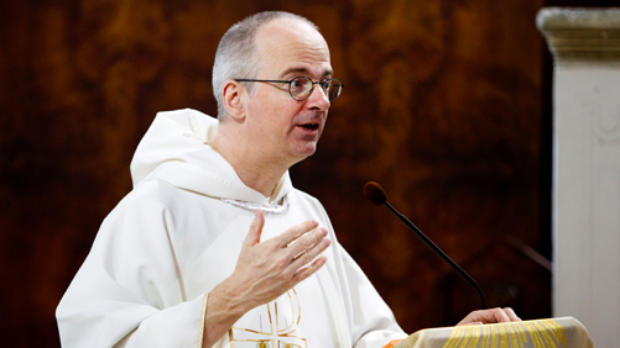It is a truism that the world of business is ruled by values other than those of religion. Material success, power and influence – these are the criteria commonly used to judgemen and women in positions of leadership. For the many young Catholics contemplating careers in areas that lack any explicitly religious character (e.g., finance, marketing,education, law), the question becomes, is a marriage possible between, say, a competence in finance and one’s Catholic faith? This question is even more pressing today for a society that has been disillusioned by the current economic woes. Over the course of the past year, the Catholic Studies Leadership Interns engaged just this topic of the intersection and relationship of faith and business. During the culmination of our year together, a 10-day Spring Institute in Chicago and the University of Notre Dame, we grappled with this question in greater depth with a number of local Catholics prominent in a variety of fields.
With perspectives ranging from the Mercantile Exchange to the courthouse to the archdiocesan chancery, we encountered successful men and women who find that Christ’s call to live as leaven in the secular loaf encompasses the marketplace as muchas the monastery. Their experience and exhortations unmasked “Big church, lots of work. Good luck.” several dichotomies as common to the contemporary mentalityas they are false to reality. Faith or work, compassion or competence, humility or success – these reflect fundamental misunderstandings of Christ’s command to live in the world, yet not of it. As Judge Thomas More Donnelley’s initiative with the Catholic Lawyers Association and efforts in spearheading a revitalized prison ministry testify, one’s place of work is always a context for living the life of Christ.
The repeated emphasis of each speaker on the centrality of prayer and the Mass underscored another crucial point made earlier in the year during our Friday seminars: a Catholic leader is not a lone wolf, but a participant in the leadership of Christ. It is Christ who complements one’s abilities and fuels one’s creativity in making faith integral to the routines and rigors of the workplace.
After spending the year learning the ins and outs of Catholic leadership, we saw before us men and women who, as leaders in their respective fields, lead precisely by following Christ, wherever this may lead. It is for this reason that following Christ is never a textbook matter. It takes place on the floor in the Chicago Mercantile Exchange; in the day-today demands of the human resources department in a top finance firm; in leading the faithful of the Chicago archdiocese.
When it comes to advice, the temptation is to ask for detailed instructions that focus on the how-to details. It is for this reason that I will never forget the advice of CardinalGeorge. Looking around at the 30 young college-age leaders waiting expectantly, he quoted Blessed John Paul II’s advice to him when he was newly appointed to Chicago, the Cardinal said simply and with emphasis, “Big church, lots of work. Good luck.” There is indeed plenty of work to be done, and it is lucky for us that we have such role models as Cardinal George, Judge Donnelley, Father Miscamble of Notre Dame and many others. Above all, we have the model of Christ, who assures us that the best way to lead is, in fact, to follow.
Daniel W. Clarke is a senior majoring in Catholic Studies and philosophy.
For more information on the Leadership Intern program of the Habiger Institute for Catholic Leadership, visit www.stthomas.edu/cathstudies/leadership/interns.
Read more from Perspectives






